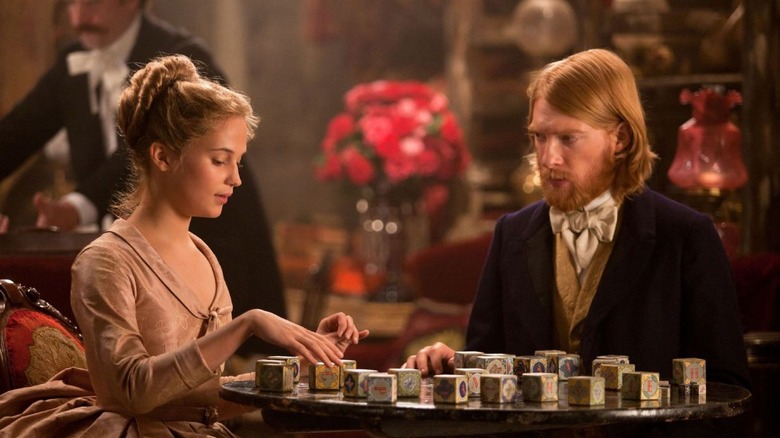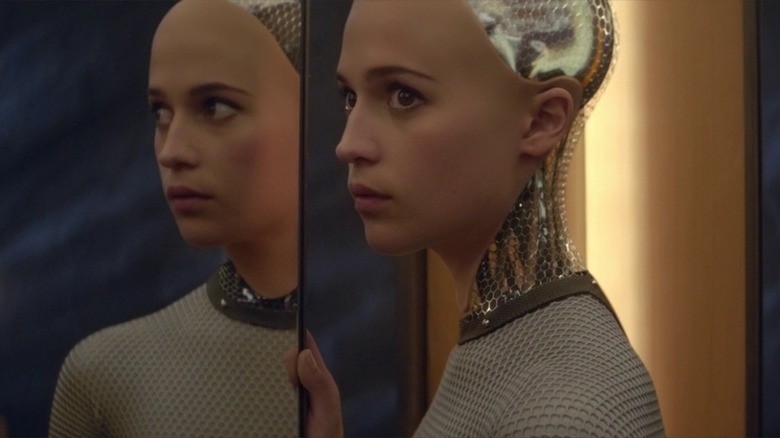Why April From Beckett Looks So Familiar
The upcoming Netflix thriller film "Beckett" is nearing its release date of August 13, 2021. The film stars John David Washington as the title character, an American tourist who finds himself as the target of a manhunt while on vacation in Greece with his girlfriend. Suddenly running for his life, Beckett must try to make it to the U.S. Embassy to clear his name.
Along with Washington of 2018's "BlacKkKlansman" and 2021's "Malcolm & Marie," the film's supporting cast consists of recognizable faces in Vicky Krieps, the co-lead in 2017's "Phantom Thread" and more recently "Old," and Boyd Holbrook, one of the stars of Netflix's "Narcos." Additionally, Beckett's girlfriend, April, who appears prominently in the film's trailer, is played by Swedish actress Alicia Vikander, whose acting career began with Swedish projects in 2002 before she eventually ventured into English-language films around 2010.
Vikander has found immense success in her acting career thus far and even has an Oscar win to her name. Here's a breakdown of Vikander's most notable roles and where you may have previously seen her.
Alicia Vikander's early roles include Anna Karenina and The Fifth Estate
In 2012, the classic 1877 Leo Tolstoy novel "Anna Karenina" received another film adaptation, brought to the screen by director Joe Wright. Vikander plays Princess Ekaterina "Kitty" Alexandrovna Shcherbatskaya, with whom Konstantin Levin (Domhnall Gleeson) is in love. Despite initially having her sights set on Vronsky (Aaron Taylor-Johnson), Anna Karenina's lover, she eventually develops feelings for Levin and the two marry.
In an interview with The Guardian, Vikander reflected on how her views of the character have changed since the first time she read the book at age 15, stating, "I thought Kitty was this young, naïve girl who didn't stand up for herself. I had to have more experience in life and now I understand every decision and the things [she] gave up or fought for."
The following year, Vikander appeared as a supporting character in the biographical thriller film about WikiLeaks, "The Fifth Estate." Vikander plays Anke, the wife of Daniel Domscheit-Berg (Daniel Brühl), the former spokesperson of WikiLeaks. Talking to GQ, Vikander discussed her knowledge on the film's subject. She said, "I knew a lot about WikiLeaks already. One of the most famous documentaries about it came out in Sweden before the war logs were released, and Julian was still considered a very brave man. 'The Fifth Estate' doesn't judge what he did, but brings the subject of transparency to the surface."
She moved on to acclaimed films Ex Machina and The Danish Girl
In 2014, Vikander reunited with her "Anna Karenina" co-star Domhnall Gleeson for the sci-fi thriller "Ex Machina." When Caleb (Gleeson), a programmer at a renowned internet company, is invited to spend a week at the private estate of the company's CEO, Nathan (Oscar Isaac), he meets Ava, played by Vikander, a beautiful robot. Caleb is assigned to be the human counterpart to Ava in the Turing test, which will determine her abilities of consciousness and emotion. Discussing her experience playing a robot (in a performance that garnered her a Golden Globe nomination) with IndieWire, Vikander said, "It was a scary thing to do, but fun because you try looking for characters you haven't done before and normally at least you can relate to the character being human."
Following her acclaimed performance in "Ex Machina," Vikander co-starred in the biographical drama "The Danish Girl" alongside Eddie Redmayne. Redmayne plays Lili Elbe, who is one of the first known people to receive sex reassignment surgery, and Vikander plays Gerda Wegener, Lili's wife. Despite taking place in the mid-1920s, a much more regressive time, Gerda is completely supportive of her spouse's gender identity journey.
Vikander spoke of playing Gerda to Collider, saying, "I love that Gerda had such an energy to her ... There's something about portraying someone that I looked up to for being so incredibly loving and good." For this performance, Vikander earned her first Academy Award win, for Best Supporting Actress.
Vikander took on the action genre with The Man from U.N.C.L.E and Jason Bourne
Vikander was a part of the ensemble cast of the action spy film set during the Cold War, "The Man from U.N.C.L.E," in 2015, alongside Henry Cavill, Armie Hammer, Elizabeth Debicki, and Hugh Grant. Vikander plays Gaby Teller, the daughter of an alleged former Nazi scientist who became a collaborator the U.S. and an agent in her own right.
Continuing with the action genre, Vikander played a part in 2016's "Jason Bourne," the fifth installment in the film series. Vikander plays Heather Lee, the head of the CIA Cyber Ops Division and the woman in charge of tracking down Jason Bourne (Matt Damon).
During an interview with Vulture promoting "The Man from U.N.C.L.E," Vikander discussed the ways in which the roles for women are evolving — for the better — in action films. She stated, "It's been interesting to do press for this film, because both Elizabeth [Debicki] and I have realized that most of the questions we get are about how unusual it is to have such strong female characters in this genre. It's just great that people seem to be so excited about it. Hopefully, we'll get over the point where people are surprised by it and it'll become a reality. You can sense that there's a feeling of change in the air, and even over the last couple of years, I think we're proving that you can have a female lead in those franchise movies and still have just as big of a success."
She became Lara Croft in Tomb Raider
Continuing to prove that women can just as well be at the forefront of action films, Vikander took on the leading role of Lara Croft in 2018's "Tomb Raider." The film, based on the 2013 video game of the same name, follows Lara Croft as she embarks on a journey to discover the mystery behind her father's disappearance.
Vikander told GamesRadar in an interview that when she first came across the video game as a kid, she was "thrilled" to see a female lead, which she had never seen before in a video game. She elaborated on what it meant to bring that role to life, stating, "I wanted to honor her and all the fans, everyone who's been following and loved this character for all of these years. Then I think what I love with our film, what we could do, is bring the humanity and the vulnerability within her, for you to relate to her and root for her and feel the journey she goes on to becoming the action hero that we've known her to be."
Vikander portrayed a renowned feminist in The Glorias
Vikander has made it clear in interviews that she wants to see Hollywood evolve in a more feminist direction, — and in 2020, she got to portray one of the most famous feminists out there: Gloria Steinem. "The Glorias," a biographical drama by director Julie Taymor, explores the life of Gloria Steinem and has four different actresses take on the role to portray her at different points in her life.
Vikander plays Gloria from ages 20 to 40 (before Julianne Moore takes on Gloria's later years), as she enters the boy's club world of journalism, expands her view of feminism and eventually co-founds Ms. Magazine.
In an interview with the Pop Culture Confidential podcast, Vikander spoke about how she approached taking on the role of the famous feminist. Vikander explained, "I was given a Dropbox with a lot of little videos from her younger years that I hadn't been able to find online or on YouTube and you see a very different kind of Gloria where you get the sense she doesn't feel comfortable in front of a camera or a journalist but she still has these very intelligent, pointed things she wants to say. And it was that kind of fight that I tried to base my section, my part, my Gloria on ... about the feeling of growing up, about finding your voice, finding who you are, what you want to do and the struggle of getting there."
Along with the upcoming "Beckett," Vikander can also be seen in the newly released "The Green Knight" and, eventually, in the confirmed "Tomb Raider 2."





